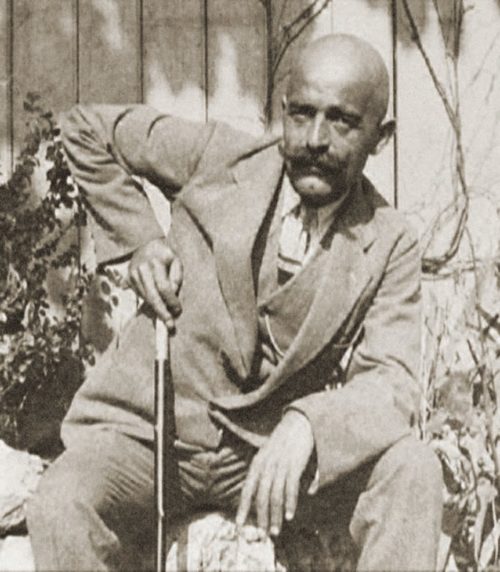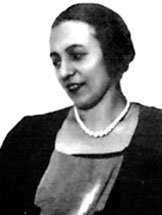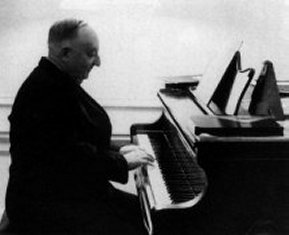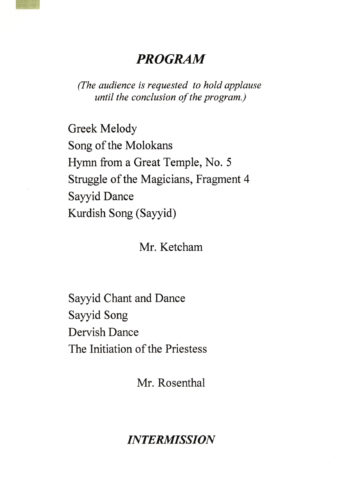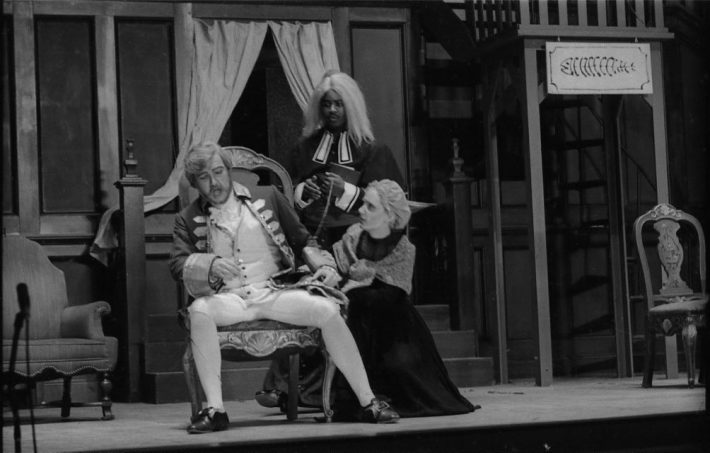Published on Oct 14th, 2024
1999: Laurence Rosenthal’s & Charles Ketcham’s Kilbourn Hall recital
In this entry I recount an Eastman graduate’s return to his alma mater, in collaboration with another performer, to share with the Eastman community some representative selections from a unique repertory that stands outside of the established canon. Twenty-five years ago this week, on the evening of Sunday, October 17th, 1999, pianists Laurence Rosenthal and Charles Ketcham gave a recital in Kilbourn Hall of music composed jointly by G. I. Gurdjieff (ca. 1866-1949) and Thomas de Hartmann (1885-1956). The two men’s performance represented the Eastman School premiere of this repertory; the printed program is displayed here. Mr. Rosenthal, BM ’47, MM ’51, has enjoyed a long and distinguished career as conductor, composer, and arranger for motion pictures and for television, as well as in the concert hall.[1] Mr. Ketcham is a noted conductor and pianist who studied at Eastman (1965-68) before completing his studies elsewhere. Both Mr. Rosenthal (b. 1926) and Mr. Ketcham (b. 1942) have had extensive experience with the music of Gurdjieff and de Hartmann, and moreover, from a position of intimate knowledge of the community in which the music originated and and in which it is ritually used. Before reading any further, I invite you to experience a sample of this music: the selection “Prayer for Mercy” (duration 2:59), played by Mr. Rosenthal and accessible on Youtube. This music is austere, ethereal, and timeless.
It is beyond the scope of this entry to delve deeply into the profound body of thought that comprises the teachings of G. I. Gurdjieff. In every age there have lived spiritual leaders and teachers who have taught the truth as they have discerned it; some have explicitly styled themselves as Seekers of the Truth. G. I. (George Ivanovich) Gurdjieff, a mystic, philosopher, and teacher, formulated and taught what he called The Fourth Way. The notes in the Rosenthal/Ketcham recital program provide some rudimentary background; elsewhere, extensive information is accessible online.[2] The practice of Gurdjieff’s teachings incorporates reading, exercises, music, dance, and other movement. Gurdjieff’s initial spiritual instruction was in the Russian Orthodox Church; in his young adulthood, his restless questioning prompted him to undertake extensive travels in Central Asia and the Middle East, where he was exposed to numerous spiritual and musical traditions. In the wake of the Russian Revolution, Gurdjieff migrated to the West. In 1922 he established a center near Fontainebleau that he called the Institute for the Harmonious Development of Man (active 1922-32). Two who were drawn to Gurdjieff’s teachings were Ukrainian composer-pianist Thomas de Hartmann and his wife Olga, an opera singer. Between 1925 and 1927, Gurdjieff and de Hartmann together produced a body of piano music, amounting to some 300 solo works that were essentially dictated by Gurdjieff and fully realized at the piano by de Hartmann. Eventually, several circumstances prompted Gurdjieff to close the Institute, among them financial considerations; following the Institute’s closure, the manuscripts of the piano music survived in the possession of Gurdjieff follower Jeanne de Salzmann (1899-1990). Madame de Salzmann eventually undertook to have the music published and recorded, which Gurdjieff himself did not appear ever to have intended. Initially, there were two private editions of the music, issued by Janus (Paris, 1950-55) and by Olga de Hartmann (1950-55, 1970).[3] The first recordings of the music were performed by Thomas de Hartmann himself. Note that these two editions were private, and availability of the music to the public lay in the future.
Several years later, the piano music of Gurdjief and de Hartmann was first brought to the mainstream audience by jazz pianist Keith Jarrett (b. 1945), who recorded 15 tracks in early 1980 for release by the German label E.C.M. (1980). Jarrett’s involvement with this music has been described by his biographer Ian Carr.[4] In short, he had read Gurdjieff several years earlier after the recommendation of one of his musician colleagues, and a member of the Gurdjieff Foundation in London suggested to Jarrett that he might record some of the music. The resulting LP marked a distinct departure for Jarrett stylistically in that he did not improvise and duly maintained the music’s austere character. The recording received some favorable reviews; Jeanne de Salzmann, having preserved the manuscripts, had allegedly reacted with surprise to the interest shown by the public.[5] Her reaction may well have contributed to the decision to seek the publication and recording, in a fixed and definitive form made generally available, of the piano music. The result was a four-volume published anthology brought out by Schott (Mainz, 1996, 1996, 2002, 2005), and a corresponding four-volume recorded anthology issued by Wergo, a division of Scott Music and Media (Mainz, 1998, 1998, 1999, 2001). The publication was edited by pianists Linda Daniel-Spitz, Charles Ketcham, and Laurence Rosenthal; the recording featured the same three pianists. Lending authority to the project was the personal involvement of Jeanne de Salzmann, who before her death had coached these three pianists out of her intimate knowledge stemming from her acquaintance with Gurdjieff. Mr. Rosenthal, for his part, later brought out his own solo recorded collection, in three volumes, of the Gurdjieff/de Hartmann music, released by Windemere Music Publishers (San Francisco, 2006, 2007, 2010). Several commercial recordings are available today, and at this time, the Sibley Music Library holds copies of those by Keith Jarrett, Cecil Lytle, Alain Kremski, in addition to one volume of the Daniel-Spitz/Ketcham/Rosenthal collaboration on Wergo.
It should be noted that Mr. Rosenthal’s involvement in this subject area also includes his having orchestrated and conducted music for the soundtrack of the motion picture Meetings with Remarkable Men (1979), a biographical drama portraying Gurdjieff’s early life.[6]
Mr. Rosenthal’s and Mr. Ketcham’s Kilbourn Hall recital was made possible by local support in that it was hosted by the Stillwood Study Center and the Rochester Folk Art Guild. No recording of the recital was archived by the Eastman School, but the work of both Mr. Rosenthal and Mr. Ketcham is perpetuated on the Schott anthology recording.
In the years since the Rosenthal/Ketcham recital in 1999, music by Gurdjieff and de Hartmann was been programmed at Eastman on one more occasion, when Bill Dobbins performed a set of eight pieces in his faculty recital “Seekers of Truth” on April 1st, 2008. Professor Dobbins prefaced his performance with remarks from the stage in which he cited Gurdjieff on his relationship with music, and also cited de Hartmann’s description of the two men’s process of composition. The set of eight pieces was comprised of two pieces from each of the four volumes of the Schott edition. A CD service copy of Professor Dobbins’ recital is accessible in the Sibley Music Library under call number SMO 2080.
[1] Mr. Rosenthal’s professional website provides extensive career information.
[2] The Gurdjieff International Review is a comprehensive source of learned content on the teachings of Gurdjieff. There are societies or foundations in many cities of the world that are dedicated to promoting Gurdjieff’s teaching, including the Rochester Gurdjieff Center in Rochester, New York.
[3] A detailed discussion of the manuscripts, the successive editions, and the first recordings of the music is provided by Johanna J.M. Petsche in her book Gurdjieff and Music: The Gurdjieff/deHartmann Piano Music and its Esoteric Significance (Brill, 2015).
[4] Ian Carr, Keith Jarrett: The Man and His Music (London: Grafton, 1991).
[5] Petsche (2015), p. 150.
[6] At this time, the entire film can be viewed without restriction on Youtube. Directed by Peter Brook and with screenplay by Mr. Brook and Jeanne de Salzmann, the film draws its title from one volume of Gurdjieff’s autobiographical writings.

